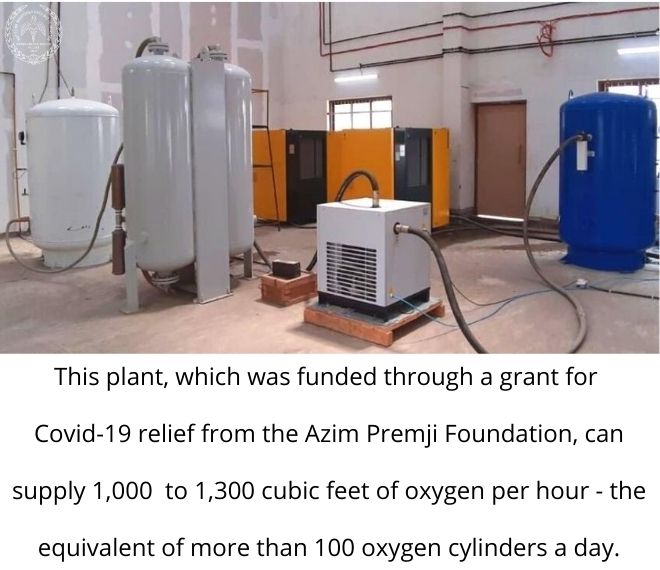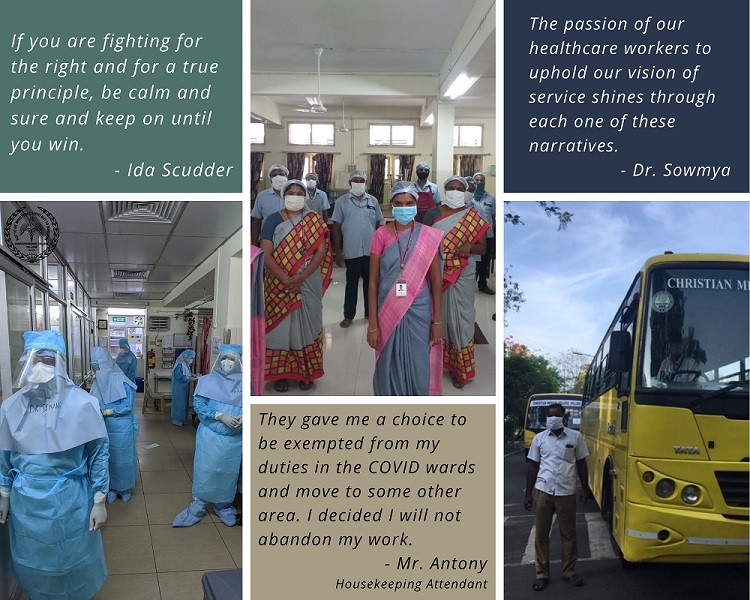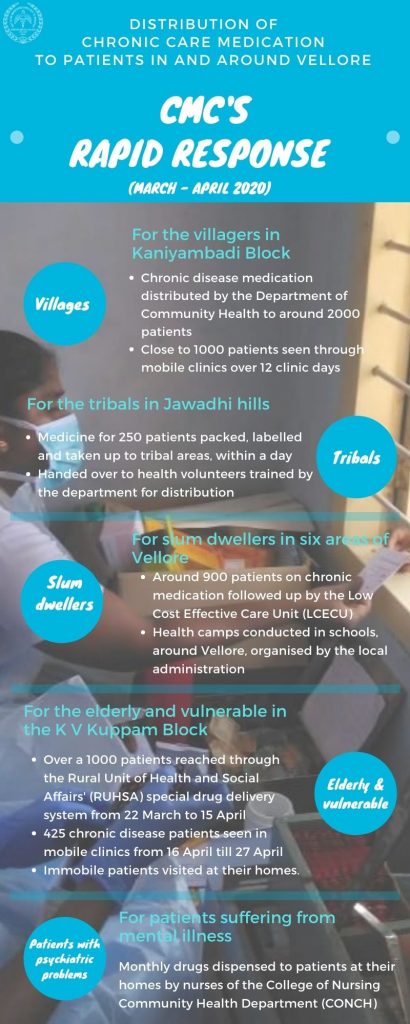July
Oxygen Generator Plant
installed at Kannigapuram Campus

CMC has installed an Oxygen Generator Plant at our new campus at Kannigapuram. Although this centre was developed as an advanced trauma and higher specialty centre, at the request of the local district administration, part of the new hospital is currently used to admit Covid-19 patients. The plant has been fast tracked to ensure that we can provide good quality oxygen to these patients, but it will continue to be of service in the new campus for many years to come.
Why a steady supply of oxygen is crucial
The air around us is about 21% Oxygen, which is ideal for most people. However, when someone experiences difficulty breathing, it may be necessary to give them high concentration oxygen. Breathing difficulty is one of the main complications associated with Covid-19, because the blood does not get oxygenated adequately. So, it is vital to have a supply of oxygen ready wherever Covid-19 patients are being cared for in a hospital setting.
Now, we generate our own supply on site!
Traditionally oxygen has been supplied to hospitals by tankers or in large cylinders. This is costly and environmentally damaging, and the supply can be uncertain, especially with continuing restrictions on transport due to lock-downs. The new concentrator plant allows us to generate our own oxygen supply on site. The plant draws in air and extracts or concentrates the oxygen, bringing it to about 95% purity.
Support from the Azim Premji Foundation
This plant, which was funded through a grant for Covid-19 relief from the Azim Premji Foundation, can supply between 1,000 and 1,300 cubic feet of oxygen per hour – the equivalent of more than 100 oxygen cylinders in a day.
Many thanks to Azim Premji Foundation for their generous grant, and to the suppliers and our engineering team for getting the oxygen plant up and running so quickly. Would you like to support us in our fight against the pandemic? Give to CMC!
– 27th July, 2020

CMC’s doctors recount their moving personal experiences in the Covid Isolation Wards. This trailer is a short introduction to the real-life stories of our doctors, nurses, medical technicians and support teams on the frontlines.
If you would like to read the individual stories, click here.
May
CMC opens COVID-19 health centre at Kannigapuram Campus
A COVID-19 care facility with 168 beds was dedicated on 27 May, 2020, at Kannigapuram Campus. An additional 168 beds and 62 Intensive Care Unit beds will be ready in the coming months in order to be fully equipped to face a possible surge of patients needing Covid-19 care. View pics
CMC on the frontlines of fight against hunger
With the pandemic raging on and hundreds of socio-economically disadvantaged people more at risk from dying of hunger than from a virus attack, CMC Vellore took up the fight against hunger as an integral component of its response to combat COVID-19.
The Department of Community Health, based in Bagayam, provides primary care to the rural and semi-urban communities of the Kaniyambadi Block as well as to the tribals of Jawadhi hills. For 75 people in the rural areas, rice, dhal, sugar, tea and spices, enough to last two weeks, were bought with contributions from within the department. This was packed into individual packets and over two days, handed over to the needy, after procuring the necessary permissions. In the tribal areas, a similar strategy was followed and with support from individual donors from within CMC and a local Christian trust, provisions were supplied to about 350 individuals.
RUHSA

The Rural Unit for Health and Social Affairs (RUHSA), which caters to the backward K. V. Kuppam Block, provided meals to 129 people in six elderly centres from the second half of April to May. Dry rations were supplied to 132 elderly, to 295 poor families and to 33 families with a disabled person. Further detailed assessment is underway to identify those with continuing need, who will be supported in Phase 2, planned for the next two months, through funds from the CBM.
LCECU
The Low-Cost Effective Care Unit (LCECU) of the Department of Family Medicine, which caters to the slum-dwellers of Vellore, started to deliver 85 packed lunches every day from the 31st of March. The Hope House, an NGO, and Papa’s House, a local church, provided the lunches. After a short time, with help from the Thrupti Foundation and a group of alumni from Ida Scudder School, this was scaled up to 400 packets a day, which continued till mid-April. From mid-April to the first week of May, the Foundation provided food for 350 people. These packets were distributed to three low-income areas through the Unit’s community volunteers. Recently, a group of young CMC doctors have joined the effort, preparing 30 more lunches a day.
As the lockdown progressed, food could no longer be delivered to many areas. Dry rations were then made available to community volunteers. A variety of simple meals were prepared in community kitchens using these and people in the area would come and collect the hot food. At the peak of the restrictions, the LCECU was able to facilitate the provision of food for upto 600 people on a daily basis.
Manna Mid-day Meal Scheme
From the very first day of the lockdown, the Manna Mid-day Meal Scheme, funded by current and ex-staff of the institution, was scaled up to respond to the needs of outpatients as well as inpatients and relatives, who were stranded in Vellore. The institutional Good Samaritan Canteen, which was making the food, was quick to accommodate the additional food requirement even though the number of staff had reduced to one-third, and the procurement of ingredients had become increasingly difficult.
Patient and relatives in need, in OP and IP areas, as well as carers in quarantine, were identified by the staff and free food arranged. A patient and his/her two attenders are eligible for six meal coupons in a day. From March 24th till date, around 13,000 free coupons have been distributed through the scheme. It came to the notice of the Missions Department, which runs the Scheme, that there were people who needed self-cooked food due to health reasons. Groups of staff from various departments arranged packets of provisions worth around five hundred rupees to help them.
Chatram
Close to 60 families stuck in CMC’s low-cost accommodation facility, ‘Chatram’ (The Inn), were also provided lunch and dinner by volunteers and staff members, in addition to the breakfast scheme in place since April 2018.
Our staff give generously to the cause
Many medical and non-medical staff in various departments, touched by the hunger of the poor around them, have opened their hearts and purses to provide support in cash and kind. Some have even supplied food made in their own kitchens.
This spontaneous response to feed the hungry is over and above the charitable response of hundreds of staff across all grades and areas of service, who through salary deductions, donated close to 1 crore to help the hospital respond adequately to the healthcare crisis that COVID-19 poses. Many senior staff were also willing to take their salaries at a later time, taking the money available to over 2 crores. Not to be left behind in this massive undertaking, the students, including medical and nursing students, contributed a total of 15 lakhs.
– 5th June, 2020
January to April
Pan-institutional preparedness and response to COVID-19
In its 120-year-old history, Christian Medical College (CMC) Vellore has grappled with many epidemics and pandemics. CMC began its preparation for the novel Coronavirus SARS-CoV-2 (COVID-19) pandemic from early January 2020, before the first case was reported in our country. Read more